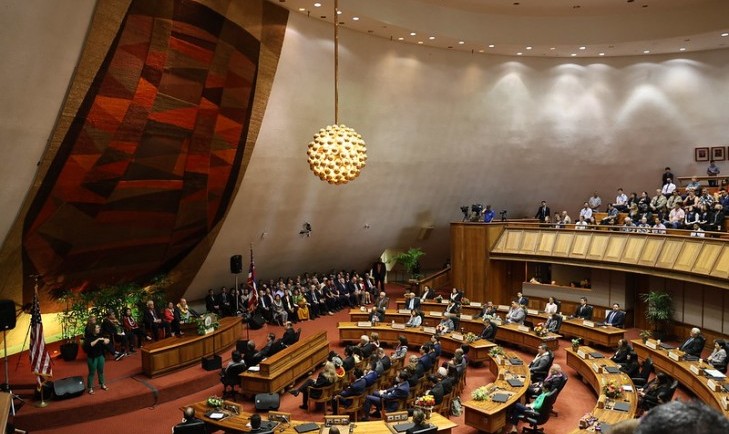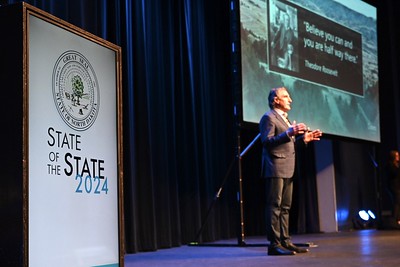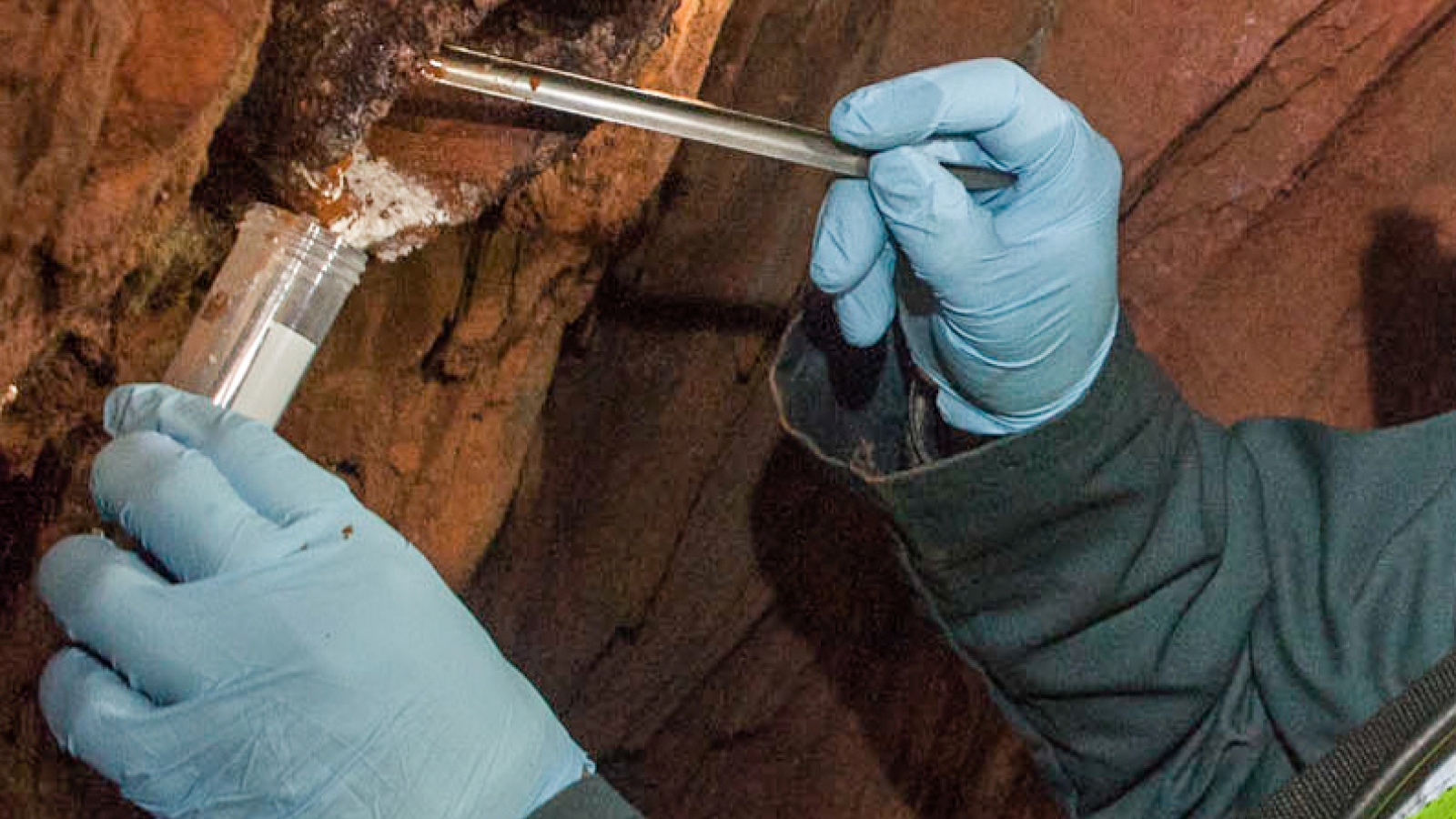01/25/24
Best of the West: Governors Burgum, Green outline legislative priorities in State of the State address; Wyoming funds decarbonization projects; $1.5 billion allocated for EVs

The Western Governors' Association keeps you updated on the latest news in the West. Here are the top stories for the week starting January, 22, 2024. (Photos courtesy of Governor Doug Burgum, Governor Josh Green, and Matt Kapust).
 Shortly after announcing that he will not run for a third term as the Governor of North Dakota, Governor Doug Burgum delivered his final State of the State.
Shortly after announcing that he will not run for a third term as the Governor of North Dakota, Governor Doug Burgum delivered his final State of the State.
During his speech, he announced an initiative to develop a comprehensive housing strategy for North Dakota as well as the launch of a new Office of Community Development & Rural Prosperity to empower communities through efficient development, economic growth and enhanced quality of life.
With the state’s reserves exceeding $1.3 billion and general fund revenues already running more than $154 million ahead of the two-year budget cycle, Governor Burgum renewed his call for North Dakota to become the 10th state to eliminate individual state income tax as a way to save taxpayers money and boost workforce recruitment and retention.
Burgum also stressed the need to expand marketing of the 988 Suicide and Crisis hotline, starting immediately with the Governor’s Office website and each cabinet agency displaying the 988 icon with links to resources for anyone in need.
To close out his speech, Governor Burgum announced that the Theodore Roosevelt Center at DSU will house the Morris Archives, an extensive collection of private research and memorabilia from Pulitzer Prize-winning history Edmund Morris, who wrote extensively about Roosevelt including well-known works such as “Theodore Rex” and “The Rise of Theodore Roosevelt.”
Watch Governor Burgums 2024 State of the State address here.
 In his second annual State of the State address, Hawaii Governor Josh Green outlined strategies to expedite the wildfire recovery in Maui, address the state’s growing housing crisis, and lower the cost of living.
In his second annual State of the State address, Hawaii Governor Josh Green outlined strategies to expedite the wildfire recovery in Maui, address the state’s growing housing crisis, and lower the cost of living.
The Governor’s “top statewide priority,” he said, is infrastructure and housing. His supplemental budget requests a total of $373 million to this end. An additional $33 million was proposed for the construction of as many as 20 new kauhale communities across the state, to reduce homelessness by 50% by 2026.
He also proposed the “House Hawai‘i’s ‘Ohana” plan, which would provide exemptions from capital gains, conveyance, and general excise taxes to owners of short-term rentals who sell to a local resident, or who convert a home to a long-term rental for a local resident.
To further reduce the cost of living, Governor Green proposed a child and dependent tax credit totaling up to $87 million annually for Hawai‘i families as well as an index of the state’s tax code to provide all taxpayers relief from inflation.
Another key point emphasis this year, Governor Green said, is addressing the state’s shortage of mental health and addiction treatment professionals and ensure that rural and under-served communities across the state have access to the healthcare providers.
Finally, Governor Green encouraged the legislature to approved $125 million to support Hawaiʻi’s public schools, including substantial funding for the Department of Education’s food service and student transportation programs.
Read a full transcript of Governor Green's 2024 State of the State address here.
Cowboy Energy: Wyoming Governor Mark Gordon approved six projects to receive Energy Matching Funds. The total awarding for all six projects is $37,513,104 – leveraging over $120 million in both federal funding and private capital for an investment of over $157 million in Wyoming-based energy projects. The projects include:
- $15,995,451 for Black Hills Energy and Babcock & Wilcox to complete designs for a project that converts coal from the WyoDak mine into low-carbon hydrogen and single-stream CO2.
- $7,792,653 for Cowboy Clean Fuels to develop its “Triangle Unit Carbon Capture and Storage Project” that uses biomass as feedstock for low-carbon renewable natural gas.
- $2 million for Flowstate Solutions to develop its AI-driven leak detection technology that addresses leak detection failures in Wyoming’s oil and gas operations, hydrogen transportation, and carbon capture and sequestration efforts.
- $8 million for Membrane Technology and Research, Inc. to design, build, and operate a 150-tonne-per-day large pilot CO2 capture system at the Wyoming Integrated Test Center.
- $2,750,000 for The University of Wyoming School of Energy Resources to develop a pilot project that can adequately treat the large quantities of water produced by oil and gas wells so it can be used for generating hydrogen.
- Williams Companies received $975,000 for their feasibility study to assess the development of a saline CO2 storage hub located at their Echo Springs gas plant in Wamsutter.
 CO2 to Solid Rock: Using microbes discovered inside the SURF laboratory in Lead, South Dakota, South Dakota Mines researchers say they can speed up a process by which CO2 from the air is mineralized into solid rock that take seven to 10 years to occur naturally. Gokce Ustunisik, an associate professor in the Department of Geology and Geological Engineering at South Dakota Mines, said this technology could replace the need for carbon capture and sequestration pipelines.
CO2 to Solid Rock: Using microbes discovered inside the SURF laboratory in Lead, South Dakota, South Dakota Mines researchers say they can speed up a process by which CO2 from the air is mineralized into solid rock that take seven to 10 years to occur naturally. Gokce Ustunisik, an associate professor in the Department of Geology and Geological Engineering at South Dakota Mines, said this technology could replace the need for carbon capture and sequestration pipelines.
Supercharging EVs: The U.S. Environmental Protection Agency (EPA) announced nearly $1 billion in awards for clean school buses across the nation. The awards will purchase over 2,700 clean school buses in 270 school districts, many of which are in the West, including $51 million for school districts in Oregon and Washington.
The EPA is currently accepting applications for the 2023 Clean School Bus Rebate Program until January 31, 2024.
The U.S. Department of Transportation also awarded $622.57 million in grant funding to 47 applicants to deploy publicly accessible electric vehicle charging and alternative fueling infrastructure, including $13.8 million to Boulder County and Colorado State University to build electric vehicle charging stations and $3.2 million to Boise, Idaho for installing 100 level-two charging ports across 20 sites, and at least four DC fast chargers.
Clean Air Shelters: Montana received $600,000 in federal funding to help Montanans better prepare for wildfire smoke. The state health department plans to launch a pilot program that will designate buildings as “clean air shelters.” That program will start in six communities statewide.